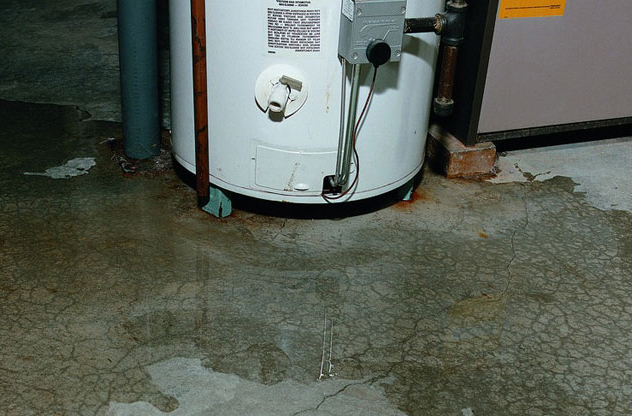Water heaters play a vital role in every home, providing hot water for essential tasks like showers and laundry. However, without proper maintenance, these appliances can develop issues that lead to water heater damage, such as leaks, inefficiency, or even flooding. If left unchecked, these problems can cause significant water damage, resulting in costly repairs. Fortunately, by taking preventive measures, you can avoid these issues and keep your water heater in good working condition. At JC Alvar Construction, we specialize in water damage restoration and understand the importance of proper water heater care to protect your home from potential water damage.
NJ's Finest Water Mitigation Company | Fire Damage Cleanup & Mold Restoration
How Residents Can Prevent Water Heater Damage and Avoid Water Damage Risks

Tips to Prevent Water Heater Damage Before They Cause Significant Water Damage
1. Set the Right Temperature
The temperature setting of your water heater plays a significant role in preventing pressure buildup and avoiding unnecessary damage. For most homes, a thermostat setting between 120 and 130 degrees Fahrenheit is ideal. Setting it too high can increase the risk of overheating and excessive pressure, while setting it too low can strain the unit and reduce its efficiency. By keeping it in this range, you can help prevent damage to the tank and ensure a steady supply of hot water.
2. Regular Visual Inspections
Regularly inspecting your water heater can help catch problems early before they turn into major issues. Look for signs of rust, leaks, or moisture around the base and connecting pipes. Rust can indicate corrosion, which can weaken the tank and lead to leaks. If you spot any issues, addressing them promptly can prevent further damage to your home.
3. Drain Sediment Build-up
Over time, sediment can accumulate at the bottom of your water heater tank, reducing its efficiency and potentially causing damage. Draining a small amount of water from the tank periodically (every 6–12 months) can help remove sediment build-up and improve the efficiency of your unit. This also helps prevent the tank from corroding over time, extending its lifespan and minimizing the risk of leaks.
4. Proper Insulation
In colder climates, water heater pipes and the tank itself can be vulnerable to freezing. Proper insulation of the water heater and pipes helps prevent heat loss, improving efficiency and protecting against freezing. Insulating pipes in unheated areas, like attics or basements, ensures that your system can handle winter temperatures without risk of damage. In some cases, insulation can also help reduce energy costs.
5. Test the Pressure Relief Valve
The pressure relief valve is a critical safety feature that helps prevent the water heater from overheating or building excessive pressure. Test the valve periodically by pulling the lever to ensure it opens and closes properly. If the valve is malfunctioning, it can lead to dangerous pressure levels inside the tank, potentially causing leaks or even an explosion. If you’re unsure how to test the valve, consider scheduling a professional inspection.
6. Professional Maintenance
While DIY maintenance is essential, it’s also a good idea to have a qualified plumber perform an annual inspection of your water heater. A professional can check for issues such as worn-out components, potential leaks, and signs of wear that may not be visible to the untrained eye. They can also perform routine maintenance tasks such as flushing the tank or checking the anode rod to ensure your water heater runs efficiently for years.
7. Address Leaks Promptly
Even a small leak can cause significant damage if left unaddressed. If you notice any leaks around your water heater or pipes, it’s crucial to act quickly. Tighten any loose connections and check for damaged seals. If the leak persists, call a plumber to inspect the unit. Allowing leaks to continue can lead to water damage that may require extensive restoration, including drywall replacement and the use of drying equipment, which is our specialty here at JC Alvar Construction.
8. Proper Location and Ventilation
Ensure your water heater is located in a well-ventilated area with adequate drainage. Proper ventilation helps prevent the build-up of moisture that could lead to mold or rust around your water heater. Additionally, placing the unit in an area with good drainage ensures that any leaks can be quickly contained and prevented from damaging the surrounding space.
Why Choose JC Alvar Construction for Water Heater Damage Issues?
JC Alvar Construction specializes in high-quality remodeling and restoration services designed to enhance both the aesthetics and value of your home. Our expert team ensures that every project is tailored to align with your home’s character and meet your unique needs. We offer the following services:
- Basement Remodeling: Transform your basement into a functional, stylish space.
- Kitchen Remodeling: Create the kitchen of your dreams with modern, efficient designs.
- Bathroom Remodeling: Update your bathroom for a fresh or luxurious look.
- Interior Remodeling: Enhance the interior of your home with custom designs and improvements.
- Exterior Remodeling: Boost your home’s curb appeal with expert exterior renovations.
Additionally, JC Alvar Construction provides essential Restoration Services, including:
- Fire Damage Restoration: Restore your property after fire damage with professional repair and cleanup.
- Water Damage Restoration: Address the impact of leaks, flooding, and moisture issues. This includes water heater damage issues.
- Mold Remediation: Safely eliminate mold and prevent future growth.
If your space has suffered water damage due to leaks or flooding, it’s crucial to first address the underlying plumbing issue. Once the plumbing repairs are completed, JC Alvar Construction can help by:
- Removing wet materials
- Setting up drying equipment
- Restoring your space to its optimal condition
The Bottom Line
Maintaining your water heater is essential to prevent costly water heater damage and ensure its long-term efficiency. By following these preventive measures, you can minimize the risk of leaks, corrosion, and other issues that may lead to water damage. If you do experience a water heater failure, it’s important to address it quickly to avoid extensive damage to your home.
Contact Us Today
If your water heater has caused damage to your home, JC Alvar Construction is here to help. We specialize in water damage restoration and mitigation, offering 24/7 emergency services. JC Alvar Construction is available 24/7 to assist with your remodeling and restoration needs. Call us at (732) 238-7892 or fill out our online Contact Form to schedule a consultation. Don’t wait—prevent further damage and ensure your home is safe.
Share this post:
Services We Provide
CALL TODAY
